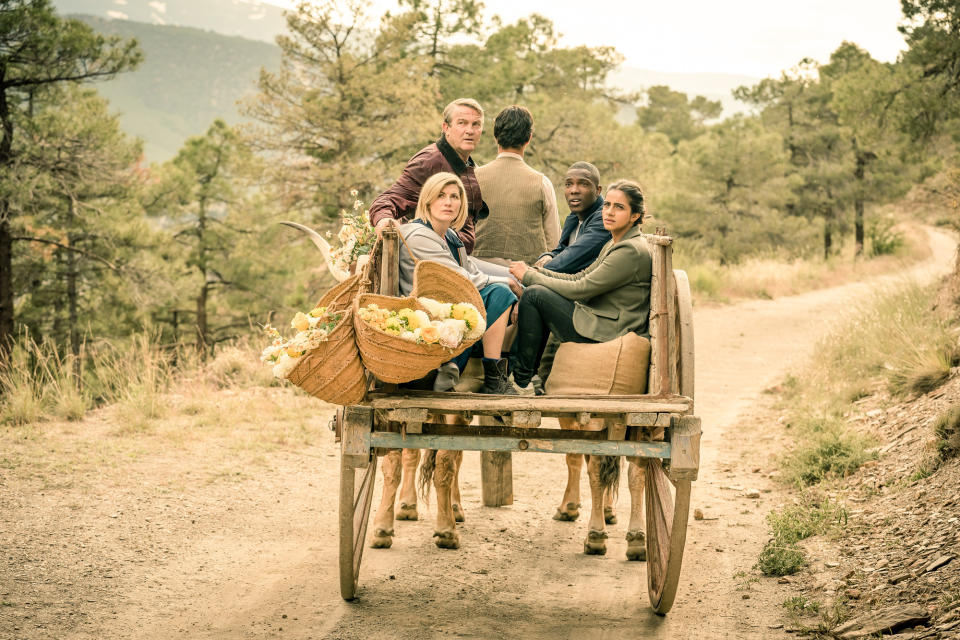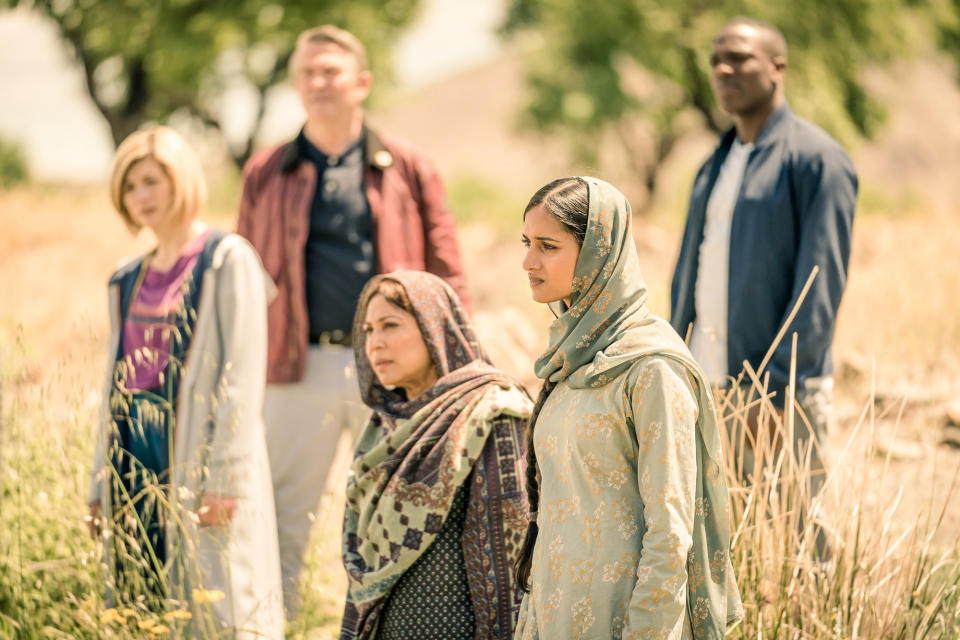'Demons of the Punjab' recap: A moving 'Doctor Who' love story set in the midst of a historic tragedy

The sixth episode of Doctor Who S11 has landed. Here’s everything you need to know about ‘Demons of the Punjab’:
What’s it about? “Family history and time travel: very tricky”, says the Doctor. And so it proves, as a trip to the Punjab for Yaz’s grandmother’s wedding – on the day of the Partition of India – takes a tragic turn.
Verdict: When Doctor Who launched in 1963, one of its central remits was to, in the words of founding father Sydney Newman, “bring history alive for the young”.
In that sense, at least, Demons of he Punjab is a solidly traditional Doctor Who story (though in the 1960s, of course, the 1947 Partition of India would barely have felt like history at all). And yet, in another way, it feels like a new departure for the show: part of showrunner Chris Chibnall’s efforts – like last month’s Rosa – to bring new voices to a series that, for all its cosmic scope, has traditionally consisted of stories told by white English men.

You can argue all you like about whether it’s Doctor Who’s job to do fly the rainbow flag for diversity – and many people are doing just that on the bottom half of the internet right now – but it’s hard to deny that the results have brought a genuinely fresh perspective to a franchise that, after 55 years, you might have thought had seen and done it all.
Besides, what really separates Demons of the Punjab from the historical Doctor Who stories of the 1960s has less to do with race than the fact that it’s a love story: a subcontinental Romeo and Juliet, in which a pair of star cross’d lovers – Yaz’s grandmother Umbreen (Amita Suman), a Muslim, and Prem (Shane Zaza), a Hindu – try to overcome the accident of birth that threatens to rend them apart, with tragic consequences.
It is also – poignantly, for an episode shown in the 100th anniversary of the armistice – about the fate of one young man: an anthem for a doomed youth, complete with vivid red poppies growing in the killing fields. As such, it’s a Doctor Who story with a rare weight of sadness, and a fatalistic sense that our usually irrepressible hero can only stand impotently by and watch tragic events take their course.

Writer Vinay Patel – whose CV includes the powerful, Bafta-winning BBC film Murdered By My Father – offers a moving exploration of themes of identity and conflicted loyalties: the walls and borders that divide families, as well as nations. It’s also incredibly beautiful to look at, director Jamie Childs capturing the drowsy idyll of the rural Punjab in the hazy last moments before its rivers ran with blood. (It’s so sumptuous and cinematic, in fact, you could almost not notice that they’ve managed to make a story about an event that displaced over 14 million people, and likely resulted in over a million deaths, with a small cast and minimal locations.)
It’s another outstanding score from Segun Akinola, too, combining sweeping, Maurice Jarre strings with elements of Eastern folk and devotional music, including an evocative vocal take on the Doctor Who theme.
Setting up the mystery of a broken watch that must never be fixed is a lovely way into the story (even if a stopped watch to symbolise a moment frozen in time is a fairly well-worn trope), and it’s nice to see Mandip Gill’s Yaz taking centre stage at last.

No doubt some will blanche at the script’s more on-the-nose emoting: does the Doctor declaring “Love is a form of hope, and like hope, love abides in the face of everything” feel a bit too much like a Sunday sermon? Plus there isn’t a huge amount to hold younger viewers’ attention here, with the eponymous “demons” – while initially scary, and brilliantly sold to us by Childs using sudden, glitching bursts of audio-visual noise – arguably under-used, and rather prematurely dispensed with.
But, like its lead character, Doctor Who has worn many faces over the years. And it’s fitting that, on this Sunday of all Sundays, we should be presented with an example of the show at its most moving, humane and emotionally intelligent: a lament for those fated to die alone, and a timely reminder that what unites us is always stronger than what divides us.

Doctor’s notes: She knows Lord Mountbatten (but this probably isn’t the time or place to talk about it). She’s supposed to be awarding her fellow travellers points, but keeps forgetting. She officiated at Einstein’s wedding (his parents didn’t approve).
Fellow travellers: Yaz’s grandmother was the first woman married in Pakistan (and the first Muslim to work in a textile mill in South Yorkshire). Graham knows “all the classics” (but isn’t allowed to sing them). He’s never, ever getting spit from an ox again.
Isn’t that…? Leena Dhingra (Nani Umbreen) gained something of a cult following as Manju Patel in EastEnders. Amita Suman (Umbreen) was recently seen as Sammera in Channel 4’s Ackley Bridge. Shane Zaza (Prem) appeared in the Black Mirror episode ‘Nosedive’.
Location, location, location: Sheffield, 2018 and the Punjab, August 1947.
Scary monsters: The Vijarian Hive. An ancient species, who were among the deadliest assassins in the known universe, until the destruction of their homeworld. Now their mission is to bear witness and honour the dead.
Quote unquote: “Tread softly. You’re treading on your own history.” The Doctor
“You know there are aliens here, right? In the Punjab, during the Partition? And you’re worried about me being gobby?” Yaz
“I don’t know whether any of us honestly know the truth of our real lives, ‘cos we’re too busy living them, from the inside.” Graham
“This is our forever. Our moment in time.” Umbreen, holding the broken watch.
Best bit: “These are demons I have to face alone.” Prem’s last stand is noble, brave and heartbreaking.
Worst bit: The episode shows its hand a little too early with the reveal of the demons’ true purpose, which rather robs the rest of the episode of scary monsters for the kids.
Scariest bit: The “demons” sudden, jarring appearance in the Doctor’s head – brilliantly realised by director Jamie Childs – followed by the image of them standing over the dead Holy Man.
Funniest bit: The Doctor: “Maybe they’re out shopping. Or bowling. Some races like bowling. I’m talking to cover up my latent worry.” Ryan: “I know. I’ve got that now.”
Back in time: The premise of a companion travelling back in time and being forced to watch the death of a family member play out was first explored in 2005’s Ninth Doctor story ‘Father’s Day‘.
Next time – ‘Kerblam!’: A mysterious message arrives in a package addressed to the Doctor, leading her, Graham, Yaz and Ryan to investigate the warehouse moon orbiting Kandoka, and the home of the galaxy’s largest retailer: Kerblam!
Read more
The Tsungara Conundrum: A fun but forgettable Doctor Who romp

 Yahoo Movies
Yahoo Movies 